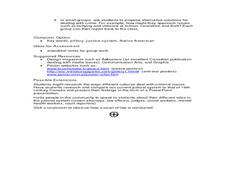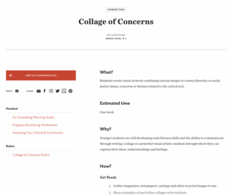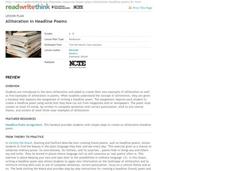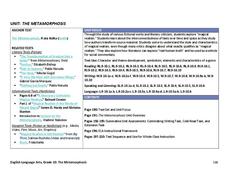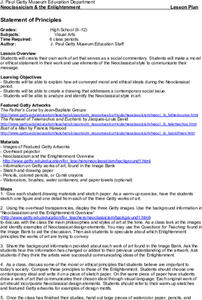University of Virginia
Analyzing Social Commentary in The Adventures of Huckleberry Finn
The Adventures of Huckleberry Finn continues to be one of the most frequently banned books. The satire and social commentary present challenges when using the book as a core text. Direct readers' attention to how Twain uses plot,...
Curated OER
Understanding Social Commentary
By learning how to identify and understand social commentary students can flex their critical thinking skills.
Curated OER
Art as Social Commentary
High schoolers engage in this thought-provoking instructional activity which has them view images from the past that depict the social condition. During the series of four lessons, pupils design a PowerPoint and a photo montage of images...
Facing History and Ourselves
Public Art as a Form of Participation
David Binnington's mural commemorating the 1936 Battle of Cable Street is the focus of a lesson that looks at public art as a form of civic participation. After reading background material about the mural, individuals analyze a segment...
Curated OER
Poetry as Social Commentary
Learners read poems with social commentaries. In this poetry analysis instructional activity, students read poems selected by their instructors and complete the provided social commentary chart to determine how the poems speak out...
Curated OER
Art as Social Commentary
Students view artworks that make a statement about social conditions. They discuss the artworks, write about them and present their ideas to the class. They create socially conscious art pieces of their own.
Literacy Design Collaborative
Author Study: Kate Chopin
Four stories by Kate Chopin offer high schoolers an opportunity to demonstrate their understanding of the ways authors use various literary elements and movements to develop their themes and social commentaries.
Curated OER
Borrowed Inspiration: Writing Social Commentary
Students read poems with social themes. In this poetry analysis lesson, students read poems selected by their instructors and complete the provided social commentary chart to determine how the poems speak out against social ills....
Curated OER
Performance Poetry as Social Commentary
Students explore poetry that examines social concerns. In this poetry lesson, students research poems and poets. Students present their findings to their classmates.
Teaching Tolerance
Collage of Concerns
A picture can speak louder than words. An interesting lesson introduces the themes of social justice and diversity to young learners by having them create artwork. Scholars create collages from a variety of sources to showcase what...
ReadWriteThink
Alliteration in Headline Poems
Poetry is everywhere you look! Create found poems using headlines from newspapers and magazines. Young poetry focus on creating alliterative phrases with words they find in headlines, tying their poems to a central theme.
Curated OER
What Makes the Writer Write
Your 11th and 12th graders are ready to critique society! Channel that inclination by studying a novel that offers social criticism of other eras (book recommendations included). This resource presents a well-thought-out overview of such...
J. Paul Getty Trust
Picturing a Story: Photo Essay about a Community, Event or Issue
Picture this. Class members follow in the footsteps of W. Eugene Smith, Dorothea Lange, James Nachtwey, and Lewis Hine by creating their own photo essay about a local event or issue.
GeorgiaStandards.org
Using Connecting Themes in First Grade Social Studies
Foster contributing members of society with a social studies unit focused on five aspects of community. First graders discuss themes of culture, groups, location, scarcity, and change with discussion questions and activities about...
Little Stones
How Can Poetry Make People Think and Care?
Can beautiful words change the world? Literary scholars discover how to paint their visions of change using poetry in a series of three workshops. Each independent topic gives participants a chance to examine their feelings about...
Alabama Department of Archives and History
Conflict in Alabama in the 1830s: Native Americans, Settlers, and Government
To better understand the Indian Removal Act of 1830, class members examine primary source documents including letters written by Alabama governors and the Cherokee chiefs. The lesson is part of a unit on the expansion of the United...
Louisiana Department of Education
The Metamorphosis
How can something be true even if it didn't happen? Invite your classes to investigate the truths found in the world of magical realism as they analyze short stories, poems, informational texts, video, and art from this genre.
Curated OER
Pinckney Benedict's "The Sutton Pie Safe" from Town Smokes
Students read Pinckney Benedict's "The Sutton Pie Safe" to learn about family symbols and social commentary. For this close reading lesson, students read four journal prompts for the story and answer the listed questions for each section.
Prestwick House
The Absolutely True Diary of a Part-Time Indian
Sherman Alexie's coming-of-age social commentary is the focus of a review activity. Learners use clues from The Absolutely True Diary of a Part-Time Indian to complete a crossword puzzle about the novel.
J. Paul Getty Trust
Tag: Whose Values
Get young people thinking about their lives and current topics of social justice, advocacy, gender, race, and identity. After examining several works by Barbara Kruger, participants select a tag with one of the questions printed on it,...
Polk Bros Foundation
American Presidents
Emanuel Leutze's painting Washington Crossing the Delaware. Alexander Gardner's photograph of Abraham Lincoln. What do these works of art tell us about the character of these American Presidents? After examining the techniques the...
Curated OER
Statement of Principles
Students create their own work of art that serves as a social commentary. In this art statement lesson, students research how art conveyed moral and ethical ideals during the Neoclassical period and create a drawing that addresses a...
Curated OER
Ellis Wilson: A High School Art Lesson
Students study the principles of design and element of the art of Ellis Wilson. They examine how art can create social commentary.
Film English
iDiots
Mobile phones have become an integral part of many people's lives. Examine the role and impact of technology through a short video and related activities. Pupils share what they use their phones for before viewing the film. Class members...







